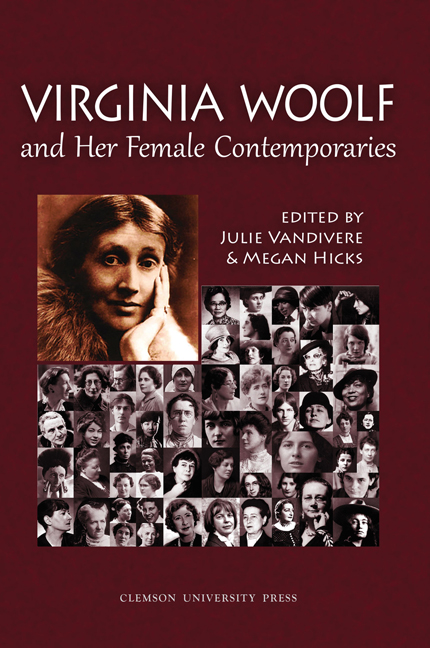Book contents
- Frontmatter
- Table of Contents
- Introduction
- Acknowledgments
- Abbreviations
- Who Are Virginia Woolf's Female Contemporaries?
- Considering Contemporaneity: Woolf and “the Maternal Generation”
- Who Is My Contemporary?: Woolf, Mansfield, and Their Servants
- “The World is My Country”: Emma Goldman among the Avant-Garde
- “Definite, Burly, and Industrious”: Virginia Woolf and Gwen Darwin Raverat
- “A Verbal Life on the Lips of the Living”: Virginia Woolf, Ellen Terry, and the Victorian Contemporary
- Twists of the Lily: Floral Ambivalence in the Work of Virginia Woolf and Georgia O'Keeffe
- Virginia Woolf's Cultural Contexts
- Virginia Woolf's Contemporaries Abroad
- Virginia Woolf's Contemporaries at Home
- Tribute to Jane Marcus
- Notes on Contributors
- Conference Program 223
“A Verbal Life on the Lips of the Living”: Virginia Woolf, Ellen Terry, and the Victorian Contemporary
from Who Are Virginia Woolf's Female Contemporaries?
- Frontmatter
- Table of Contents
- Introduction
- Acknowledgments
- Abbreviations
- Who Are Virginia Woolf's Female Contemporaries?
- Considering Contemporaneity: Woolf and “the Maternal Generation”
- Who Is My Contemporary?: Woolf, Mansfield, and Their Servants
- “The World is My Country”: Emma Goldman among the Avant-Garde
- “Definite, Burly, and Industrious”: Virginia Woolf and Gwen Darwin Raverat
- “A Verbal Life on the Lips of the Living”: Virginia Woolf, Ellen Terry, and the Victorian Contemporary
- Twists of the Lily: Floral Ambivalence in the Work of Virginia Woolf and Georgia O'Keeffe
- Virginia Woolf's Cultural Contexts
- Virginia Woolf's Contemporaries Abroad
- Virginia Woolf's Contemporaries at Home
- Tribute to Jane Marcus
- Notes on Contributors
- Conference Program 223
Summary
Virginia Woolf 's engagements with artistic and feminist history were often shadowed by the problem of ephemeral contemporaneity. While figures like T. S. Eliot were able to envision the literary tradition existing within a timeless and autotelic simultaneity, Woolf 's own understanding of the continued presence of the past was constantly challenged by her awareness of the material inequalities that defined that past and the forms of female cultural production that remained invisible and fleeting, resistant to the ossification and enduring life of print. This awareness dominates an essay Woolf wrote in December 1940, a meditation on the life and work of acclaimed Victorian actor Ellen Terry (D5: 329).
Few subjects could have better served Woolf 's reflection on the vagaries of historical consciousness and the peculiar values of contemporaneity. Born in 1847 to a family of actors, Terry grew up in the theater, identifying fully with the stage from an early age. In the latter decades of the nineteenth century, she rose to the pinnacle of her craft and her profession at the Lyceum Theatre, where her Shakespearean performances alongside the actor-manager Henry Irving inspired adoring missives from such Victorian luminaries as Lewis Carroll and Oscar Wilde (Terry 140). She was—in her own words and those of her admirers—“the Terry of the age” (56), an ambivalent, multifaceted icon of Victorianism in art, politics, and culture. Woolf may have seen Terry when she appeared at the Court Theatre as Lady Cicely in Bernard Shaw's Captain Brassbound's Conversion in 1906. But soon thereafter, Terry's career began a gradual close. As many have remarked, Terry's mode of acting and the overwhelming force of her celebrity could find no place on the modern stages of the twentieth century. She died in 1928, seemingly left behind by the medium she once defined.
It is therefore unsurprising to note in Woolf 's belated retrospective unique evasions of the historical record and a tone of benign nostalgia for the effervescence of Terry's luminous personality. Indeed, Woolf 's prose swiftly enacts a sort of transubstantiation in which the actor's conception is loosed from her body and thence unites with the immaterial ideal of the role itself.
- Type
- Chapter
- Information
- Virginia Woolf and Her Female Contemporaries , pp. 29 - 35Publisher: Liverpool University PressPrint publication year: 2016



